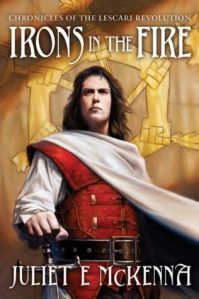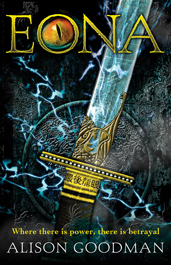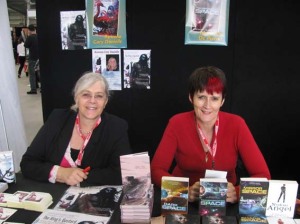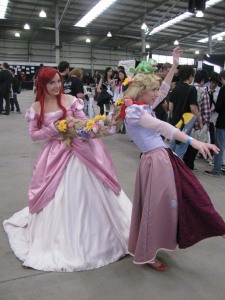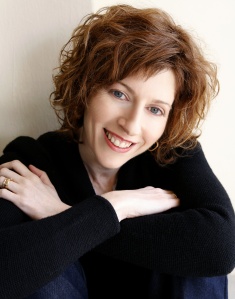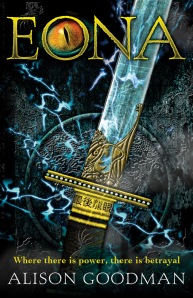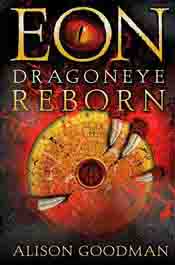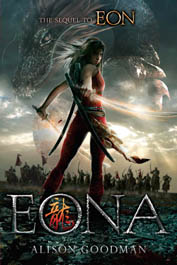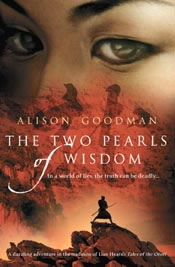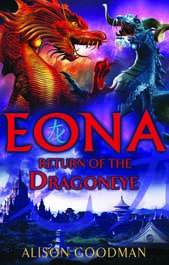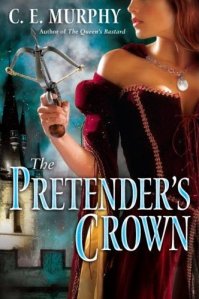As the next of my series featuring fantastic female fantasy authors (see disclaimer) I’ve invited the talented Mary Victoria to drop by. Mary’s first book in the Chronicles of the Tree trilogy, ‘Tymon’s Flight’, was nominated for three different sections of the Gemmel Awards, Morningstar (new talent), Legend (best fantasy) and Ravenheart (best cover). Mary’s latest book, ‘Samiha’s Song’ has just been released. Watch out for the give-away question at the end of the interview.

Q: Samiha’s Song is book two of The Chronicles of the Tree (Book One – Tymon’s Flight). From the blurb there seems to be a ‘World Tree’ did you kick yourself when Avatar came out, or did you figure lots of stories feature trees, going right back to Norse mythology, and Avatar could only help sales of your book? (If you’d like to browse inside Samiha’s Song see here).
No, I did not kick myself. <grin> I’d written the story long before ‘Avatar’ came out, and really the World Tree in ‘Tymon’s Flight’ is quite different to the hometree in Cameron’s film. It’s far larger, for one thing, the size of the Himalayan mountain range. Don’t think ‘big oak or elm’, but rather a huge and tangled agglomeration of branches, trunk and foliage, a messy continent of vegetation extending over hundreds of miles. In fact, my World Tree concept is probably closer to the one in Kaaron Warren’s wonderful ‘Walking the Tree’, also published in 2010 with Angry Robot. (I have since had the joy corresponding with Kaaron regarding our mutual Tree obsession and parallel stories of publication – one of those odd coincidences where people come up with similar ideas independently. I highly recommend ‘Walking the Tree’, by the way!)
Comparisons with Norse myth are apt, and Yggdrasil was one of the main inspirations for the Tree in ‘Tymon’s Flight’. I wanted an environment that could conceivably contain a world – or at least, what human beings might think of as ‘the world’ at a certain point in their development (remember, for a medieval peasant in Europe, ‘the world’ wasn’t much bigger than the lands adjoining the Mediterranean sea.) Again, you could compare the World Tree to a small, isolated continent with a self-contained culture just on the cusp of technological growth. For most people in that culture, the Tree contains everything, from human civilization in the middle canopies to heaven in the highest branches, and hell at its roots.
It’s a very belief-bound universe. Science is mistrusted and free thinkers are labelled heretics.

Q: When I read the cover blurb I had the feeling you were writing Young Adult, but it didn’t say this anywhere. Then I read in an interview that, while book one was written for YA, your editor asked you to write the second book for adults. Did you enjoy the freedom this gave you to go darker and deal with more confronting themes?
I did start out writing the Chronicles of the Tree for a YA-crossover audience – that is, aimed at ages 12+. The books were always meant to appeal to an adult audience as well, however, and I based my idea of ‘12+’ on the books I was reading at that age – works of Tolkien, Ursula Le Guin, David Eddings, Anne Mc Caffrey. Those books are all now classified as adult fantasy, so I am not too surprised Voyager decided to market COT as they did!
Creatively, the decision to market to adults freed me up in many ways. I was able to darken up the mood and depart from the ‘coming of age’ format in the second book, tackling themes I might have avoided had the book been geared to a younger audience (I tend to give 15 as a minimum age guide now, though every reader develops at a different rate so that’s not a hard and fast rule.) There is no explicit content, per se, but in terms of plot ‘Samiha’s Song’ has definitely moved beyond the teenage narrative to step firmly into adulthood. Injustice, slavery, torture – these things are unfortunately a part of Tymon’s world, and the story doesn’t shy away from them.
Q: You say that Samiha’s Song is about the main character’s idealism and how it gets her into trouble. Would you like to expand on this?
‘Samiha’s Song’, despite the title, is still Tymon’s story – but he does share a fair amount of the limelight with Samiha, whose emotional journey, whether seen from her own point of view or those of the people surrounding her, remains the driving force of this book. She is the central mystery around which Tymon and others revolve. She is also a mystery to herself, to begin with, which makes this story essentially one of self-discovery.
As we meet her in ‘Tymon’s Flight’, Samiha is a defiant idealist, very much concerned with the plight of her people, the Nurians. In ‘Samiha’s Song’, however, her outlook on issues of freedom and responsibility both broadens and deepens. She advocates a non-violent approach to change – an attitude that gets her into trouble with both the colonial authorities and the Nurian rebels, for different reasons. Mostly, her contemporaries are annoyed with her because they can’t control her. No one quite grasps what makes Samiha tick – except perhaps Tymon, who stands by her to the very end.
 Q: I see you’ve lived all over the world and finally settled in New Zealand with your husband and daughter, after working on The Lord of the Rings movies. First of all, let me say how jealous I am. Working on LOTR must have been a wonderful experience. You worked as an animator. Is this 2D or 3D? Plus can you tell us a little about your experiences while working on LOTR? (I confess I’ve watched all the special features on the extended version of the DVDs. Yes, I am a nerd).
Q: I see you’ve lived all over the world and finally settled in New Zealand with your husband and daughter, after working on The Lord of the Rings movies. First of all, let me say how jealous I am. Working on LOTR must have been a wonderful experience. You worked as an animator. Is this 2D or 3D? Plus can you tell us a little about your experiences while working on LOTR? (I confess I’ve watched all the special features on the extended version of the DVDs. Yes, I am a nerd).
Nerds rule! Working on LOTR was indeed a dream job for me, as I was a huge fan of the books. I was a 3D animator – in other words, I worked with a model in a computer, rather than drawing cells by hand. It’s quite similar in many ways to animating stop motion. I pursued that line of work for almost ten years, from 1994 to the end of ROTK in 2003. At that point I abruptly changed gears.
It’s odd, transferring careers. Most people who knew me as an animator aren’t aware I now write books. And most people who read my books aren’t aware I once was an animator. But I can confidently say both lines of work are painstaking, all-engrossing affairs. Neither career permits half-measures. You know the adage – creativity is 5% inspiration, 95% perspiration. I threw myself heart and soul into being an animator; that same energy now goes into my writing.
By far my favourite aspect of working on LOTR were the occasional glimpses I had of the live-action shoot. There’s something very special about that, particularly to someone used to toiling away in the background, behind a computer screen. I loved visiting the different sets, meeting actors, smelling the burnt dust smell on the lighting. That sort of thing sends my geekmeter soaring.
Q: I see that you had your latest book was launched in Wellington. (See launch here). Did a lot of talented creative people end up living in New Zealand because Peter Jackson filmed LOTR there? (Mary knows some talented artists and is lucky enough to have had them do illustrations for her stories. See here).
Certainly the Jackson films have drawn a pool of international creatives to Wellington. But there was already a core group of determined Kiwi artists in this town, without whom the LOTR projects would never have taken off. I’m thinking of the local designers, sculptors and craftsmen at Weta Workshop, as well as the largely Kiwi shooting crew on the films. The project really was the home-grown affair it is made out to be. Where there was a much larger pool of international participants was in post-production, at Weta Digital. Many people like myself came to work there on a temporary visa ten years ago, and went on to gain residency and stay in New Zealand.

Tymon's Flight
Q: I was prompted to start this series of interviews because there seems to be a perception in the US and the UK that fantasy is a bit of a boy’s club. Do you think there’s a difference in the way males and females write fantasy?
No! If you were to read me a passage from a good fantasy book without telling me the name of the author, I would be hard-pressed to guess the sex of the person who wrote it. But there seems, from what you have told me, to be a difference in the way genre fiction written by men and women is perceived by some members of the reading public.
Fantasy is certainly not a boy’s club – there are scores of successful women in the field. Long-established US and UK names that spring to mind are Robin Hobb, C.J. Cherryh, Lois McMaster Bujold, Ursula K. Le Guin, Nalo Hopkinson, Ellen Kushner, Elisabeth Moon, Glenda Larke, Jennifer Fallon, Anne McCaffrey, Diana Wynne-Jones and Karen Miller. I’ve mentioned traditional or ‘epic fantasy’ authors, but there are countless others; Urban fantasy and YA fantasy sub-genres are practically overrun by women. The US/UK adult fantasy scene has additionally seen an influx of excellent new women writers in recent years: Catherynne Valente, N.K. Jemesin, Nnedi Okorafor, Helen Lowe, Susanna Clarke and yourself, to name only a few. (My examples include some Australian and New Zealand writers who publish in the US or UK, but there are of course many more wonderful voices from the antipodes: Fiona McIntosh, Kim Falconer, Philippa Ballantine, Kylie Chan, Trudi Canavan, Pamela Freeman, Traci Harding… the list goes on and on.)
So why are these talented women not registering on peoples’ radars? Are women writers of genre more ‘invisible’ than their male counterparts in the UK and US? Do people ‘forget’ female names when thinking of their favourite fantasy authors? …I don’t know the answers, I’m just asking the questions.
Part of the problem might be the same one that affects midlist writers of any variety, genre or mainstream. Most bookstores run on the chain store model only actively promote a few bestselling titles. These are the ones that are placed in eye-catching displays, the ones bookstore reps often read and hand-sell, the ones reviewed, promoted and discussed. Many slightly less well known but good quality titles tend to be overlooked. Could midlist female fantasy writers in the UK and US be falling into the ‘overlooked’ category, perhaps?
Q: Following on from that, does the gender of the writer change your expectations when you pick up their book?
Again, not in the least. I do have some unavoidable expectations to do with the genre of a book: I expect romance from the romance writers, invented worlds from the fantasy writers and brain-teasing ‘what if’ speculations from the science fiction writers. But that’s just the tip of the iceberg. Personally I love it when people mix things up, turn my expectations on their heads, mash genres together and, quite simply, write well. How they do that is in no way related to their gender.
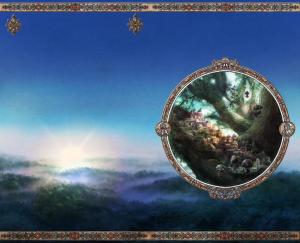
Q: And here’s the fun question. If you could book a trip on a time machine, where and when would you go, and why?
Is your time machine equipped with a singularity survival kit? I’ve always wanted to check out the interior of a collapsing star. That, and visiting a Big Bang moment (I like the theory that there are many Big Bangs, multiple moments of creation.) But I guess I’d skew the whole ‘singularity’ thing just by being there, and being me – ie., not infinitely small, hot, and dense. (Alright, maybe I could do the dense bit.)
Why would I visit such a time and place? It’s the lure of the absolute, I guess – creation and annihilation, those two Janus faces of existence. Also, there’s a ridiculous attractiveness to infinity. It’s an impossible quest: my brain wouldn’t be able to process such an event, even if there was a way to survive it. Give me a god-brain, or at the very least one of Iain M. Banks’ machine Minds – a brain capable of processing infinity – and we’ll talk.
When I was a kid I’d lie on the ground staring up at the night sky, imagining what life might be up there, circling the stars. It always pleased me that I was looking up at a picture of the very distant past, gazing at something that might no longer exist. In that way, we are all time travellers, every single night, staring at a light that once was, long ago, in a galaxy far, far away…
Give-away Question:
If you could have played any character in the Lord of the Rings Movie, who would it have been, and why?
(We’ll keep the give-away open for a week, then let you know who Mary chooses as the winner).
 Can’t spot any typos myself, but then I have a background in graphic art so I tend to see design, not words. I think the cover fairies have been kind to me again. What do you think?
Can’t spot any typos myself, but then I have a background in graphic art so I tend to see design, not words. I think the cover fairies have been kind to me again. What do you think?

